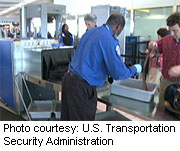Holiday Travel Tips for People With DiabetesExpert advice on managing airport hassles, time-zone changes and insulin needs.
FRIDAY, Dec. 23 (HealthDay News) -- If you have diabetes and plan on traveling this holiday season, there are certain things you need to do to safeguard your health, says a University of Alabama at Birmingham expert. "I tell patients, especially type 1 diabetics, to be diligent about blood sugar control when they travel -- especially across time zones -- because it's easy to lose control of your glucose management when you get out of your usual routine," Dr. Fernando Ovalle, director of the UAB Multidisciplinary Diabetes Clinic and a senior scientist in the UAB Comprehensive Diabetes Center, said in a university news release. When traveling in the United States or to most places in Europe, you should pack twice as much medication and blood-testing supplies as you think you need. If traveling to places where medical resources may be scarce, pack three to four times that amount, Ovalle recommended. Pack at least one set of medication and supplies in a carry-on bag and keep the bag with you at all times so you always have medication on hand, even if your checked baggage is delayed or lost. Reduce the risk of airport hassles by carrying a letter and prescription from your doctor. The letter should outline the treatment for your diabetes (such as, "take diabetes pills or insulin shots") and list syringes, insulin and any other medications or devices you use. If you're traveling across time zones, start adjusting your medication times for insulin in increments in the days before you depart. If the time change is more than four hours, ask your doctor to create a new dosing schedule in order to reduce your risk of making a mistake, Ovalle said. If you're traveling long distances, make sure you move around or get up and walk at least every hour or so. People with diabetes are at increased risk for blood clots and movement can help prevent them. People with insulin pumps need to be careful when flying. Research has shown that changes in airliner cabin pressure during flights can cause insulin pumps to deliver too much insulin when the plane is climbing, Ovalle said. "Individuals with diabetes who are extremely sensitive to insulin may want to consider disconnecting the device before taking off and while the plane is ascending, as well as checking the insulin supply for air bubbles upon landing," he suggested. More information The U.S. Centers for Disease Control and Prevention offers tips for managing diabetes during the holidays. (SOURCE: University of Alabama at Birmingham, news release, December 2011) Copyright © 2012
HealthDay. HealthDayNews articles are derived from various sources and do not reflect federal policy. healthfinder.gov does not endorse opinions, products, or services that may appear in news stories. For more information on health topics in the news, visit Health News on healthfinder.gov. |